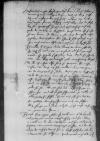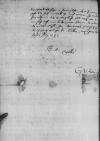Dem hochwirdigen in Got fursten und hern, hern ⌊Johan Dantisco⌋, / bischoven zu ⌊Colmen⌋, seiner ⌊koniglichen maiestet zu Polen⌋ orator peÿ ⌊romischer kayserlicher maiestet⌋, meinem gnedigsten herren
an ⌊romischer kaÿserlicher maiestet⌋ hoff
wess ich Ewer Ganden auff ditz mal nichts anders anzuzeigen, / alleine wir haben nach unsern fromen ⌊Nibschitz⌋ / noth alhii. / Hat die sachn dis hern margraff Jorgen vortragen, vorsich mich als pott der vortrag in buchstaben pracht wirdt, / szo zeucht hir von hinen. / In summa, er hat sich dermassen alhie gehalten, / das ich seiner kin schands hab gelaiste, auch ime nach meinem besten vormogen gut bruderschafft. / Ich willer Ewer Gnaden gerne etwas newes von hinen schreiben. Szo wiss sÿ wol, / wen ein anstand ader frid gemacht wirdt, / szo pegibt sichs selten etwas, / das do zu schreibn wer, / aber krig und unrhue gibt newerzeittung krafft. / ⌊Romische konigliche maiestet⌋ helt alhie haus zu ⌊Pragaw⌋, / kan nicht wissen, wie lang. / Es hebt widderumb ein wenig an, vor die langeweile zu sterben, / doch nichts am hoff, allein under dem gemainen man. / So ist es auch ein tewrung alhie, / dergleichen kein mensch gedengk. / ... macze habers umb 17 gulden, die man vormals zu ... aber 3 gulden gekaufft hat, / aber Got hab lob, / es ist alhie gar ein schone zeit, / und alle fruchte stehen wol, / ist widderumb alles guttes zu hoffen. / Es wer auch schie zeit, das uns seine gotliche barmhertzigkheit eins mals / von solhem krieg, hunger und sterben erloset, / sunst mocht es in ein gewonhait khomen /
Ich wil Ewer Gnaden gepeten haben, / sy wolle meim bruder Cornelio vil guetes von meinet wegen anzeigen / und inen bitten, er welle mir den hern ⌊Valdesium⌋ / und hern ⌊Alexandern Schweis⌋ / von meinet wegen vast grussen, / und dem hern Alexandro anzeigen, das ich ine 2 brieff geschriben, aber kein anttwurt von im bekhomen, / sonder es wil mich bedungken, das ich vil vleissiger in seinen sachen, / als er in meinem gehandelt habe. / Er welle ⌊in⌋ nach ermanen, / szo wirdt hers erkhennen, / das es vorgleicht sal werden, / wie die eine sache trifft mein bruder ⌊Cunrat Maier⌋, / die ander ..., als er wol wissen hat. / Damit wil ich ouch Ewer Gnaden, der ich gantz und gar bin bevolhen. /


